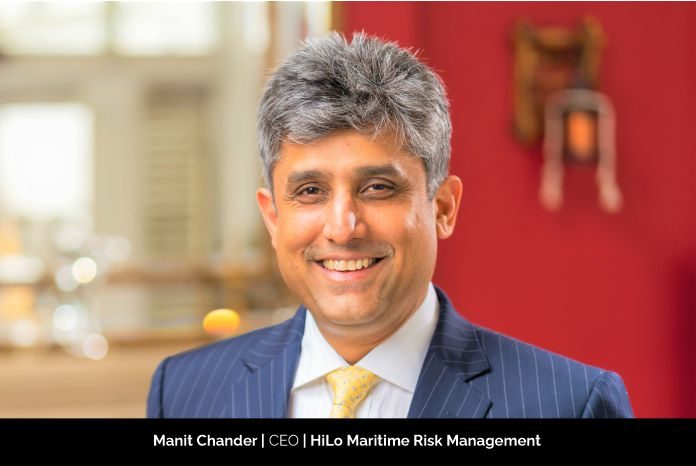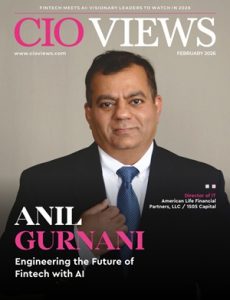Manit Chander is a seasoned strategist obsessed with using technology to revolutionize the maritime industry. As the CEO of HiLo Maritime Risk Management, he is sailing the company on a high tide and is all set to take it to the next level.
All his early life, he was surrounded by three things: the ocean, ships, and white uniforms. Stepping into the maritime industry was a foregone conclusion.
An unorthodox style
With experience of both the startup and corporate worlds, Manit shaped the path for HiLo with the best of both styles. With corporations, it is all about setting a course and working on it until it is achieved. Contrary to this approach, in startups, it is important to stay agile. The end goal remains the same, but the steps to get there are tested and changed until the best solution is found.
The HiLo takes advantage of the perks of both styles. The Board consists of seasoned experts of the corporate world who have vast experience in different areas of the industry. HiLo’s in-house team works with a methodology that comes from the startup world. It is all about ‘Build, Measure, and Learn.’ The team builds a solution, measures the efficacy, learns from the mistakes, and repeats the process to grow further. Unlike the corporate style, which says to keep following a single path and stay committed to it, Manit leads with startup-style which allows for U-turns while progressing forward, staying flexible with the working approach.
Understanding the problem is half the solution
Being a captain in the maritime industry means that Manit has witnessed the problems faced by mariners closely and experienced them first-hand. As Albert Einstein quotes, “The definition of insanity is doing the same thing over and over again but expecting different results.” The maritime industry has approached maritime safety in the same way for decades, but life-threatening incidents are still occurring. Manit worked with a dedicated group of seafarers across multiple companies to discover a, effective new way to prevent these high impact incidents.
Manit realized that the data in the maritime industry was not shared properly between shipping companies and other industry bodies. Many different systems were created to analyse the root causes of previous incidents and find insights from them. Manit and the team created a tool to look forward and prevent incidents from happening in the first place.
He combined his business and management skills with his experience in the maritime industry and piloted HiLo with a small number of companies. The predictive approach was shown to be effective. Following a balanced approach, he is solving the issues of the maritime industry with a data-based solution. HiLo became independent in 2018 and has increased its reach fivefold.
Conquer the fear to fail
Manit believes that it is vital to grab the hidden opportunities found in challenges. No doubt, challenges test a person’s character, but to evolve into a successful leader, a person should never be afraid to fail, because that is the best chance to learn and evolve.Being the victim of the circumstances will only add stress to the person’s shoulders. So, it is necessary to look beyond the fear of the challenge to become stronger and climb the ladder of success.
For his whole life, Manit has seen every challenge as the next stepping-stone to something exciting. When he witnessed maritime industry’s data gap, he looked at it as an opportunity and grabbed the chance to create something unique that would help everyone in the industry.
He states, “It is all about staying strong, believing in yourself, and maintaining a never-give-up attitude. When you hit rock bottom, at that moment, you need to gather all your strength, rise without losing hope, and you will witness surprisingly good results.”
Evolving with changing trends in the maritime industry
The maritime industry is going through a technology revolution. Every entity in the industry is going through a shift towards digitization. However, not every one of them is moving at the same pace. The gap between the most and least technologically advanced is vast, creating a state of imbalance.
Manit is focusing on bridging the gap between these entities with HiLo. The company is using the power of Big Data Analytics to meet the needs of shipping companies, while taking into account their varied levels of digitisation. HiLo is flexible, bringing all its customers to the same level of data-driven analysis, no matter where their starting point is.
He wants to remove the fear of sharing data in the industry to create better solutions for everyone. Besides improving the efficiency of safety campaigns to save lives of the mariners, Manit wants to improve the performance of every aspect of the industry through better data sharing.
To achieve all these goals, he framed two strongholds of HiLo, namely, Trust and Customer-centricity. Both these traits run across the company, both internally and externally. From decision-making to development, the team stays true to these core values. The company maintains a space where nobody has a fear of failing and has the opportunity to create better solutions that revolve around the customers.
Man on a mission
As the CEO of Hilo, HiLo supports his team to succeed. Manit follows a wide and strategic approach while leading the company upfront and takes on the challenges with a positive mindset. Team members are encouraged to speak their minds and share ideas without fear of being put down. This open communication is at the core of HiLo’s innovation. H
He encourages the team to share stories of the impact that HiLo has on seafarers to show the real-life value of their hard. He makes sure that success stories are celebrated among team members as a reminder of what HiLo is achieving in the industry.
Doing all these things puts Manit in a challenging situation when it comes to balancing his work and personal life. However, he supports his team members to lead a balanced life, and he himself, is looking forward to it – one day.
Top line vision for the company
Manit aims transform HiLo into the maritime industry’s knowledge centre. He expresses, “We should be the go-to organization for everyone when it comes to safe sharing of data and getting meaningful results out of it.”





